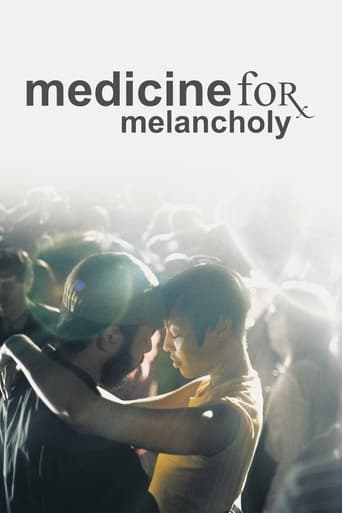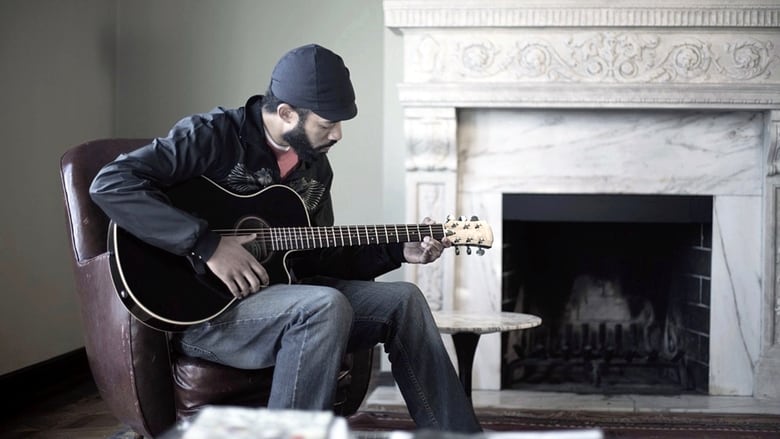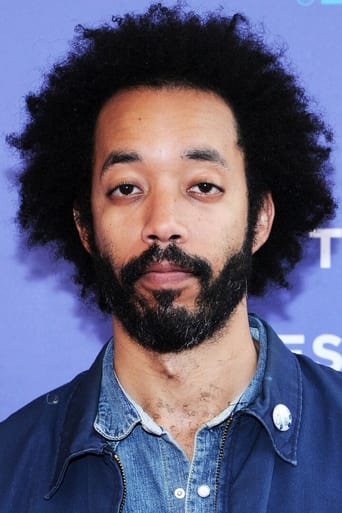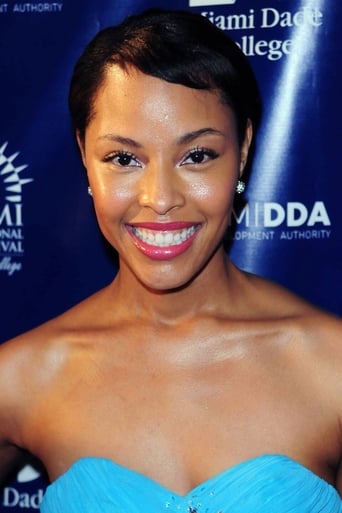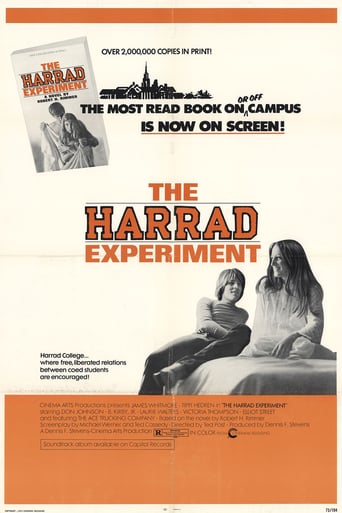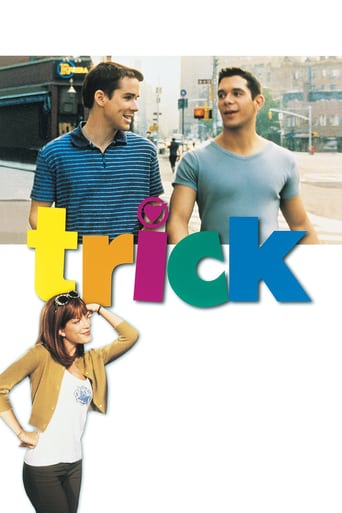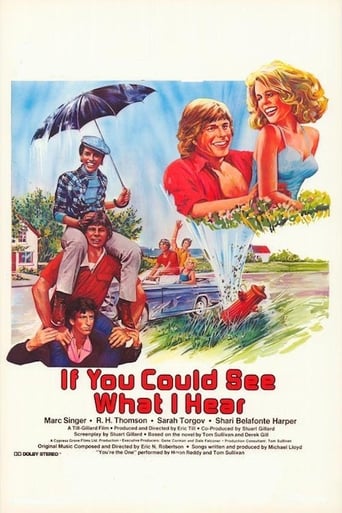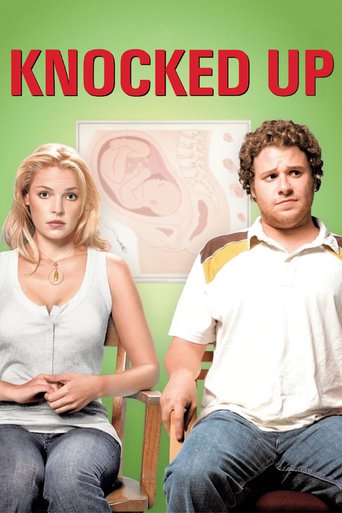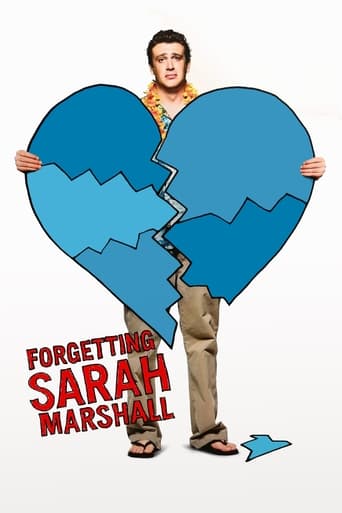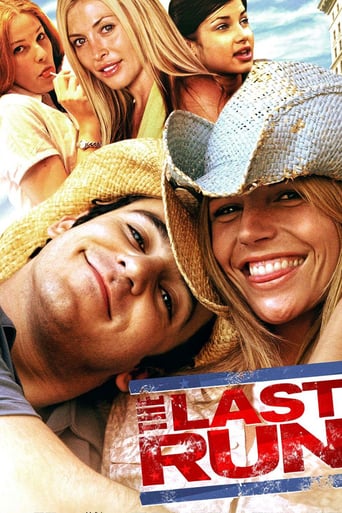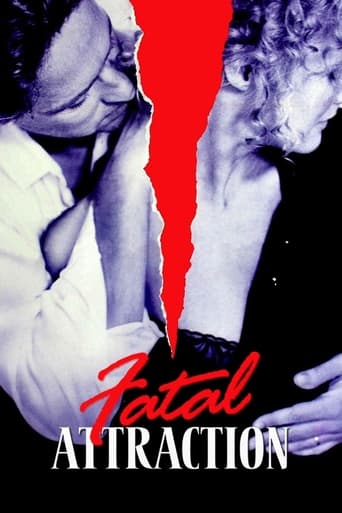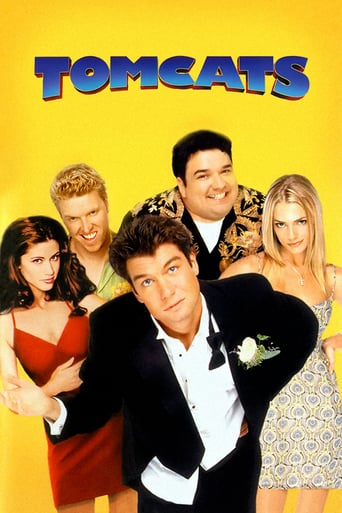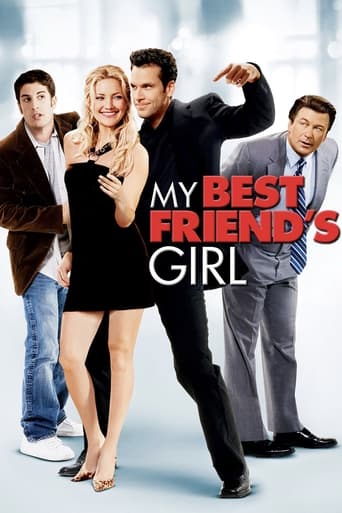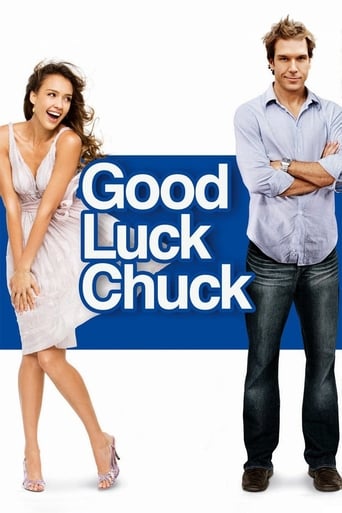Medicine for Melancholy (2008)
Waking from a one-night stand that neither remembers, Micah and Joanne find themselves wandering the streets of San Francisco, sharing coffee and conversation and searching for a deeper connection.
Watch Trailer
Cast


Similar titles
Reviews
Medicine for Melancholy finds Barry Jenkins in his first feature as writer and director grasping for nothing. I can believe he was working from a script, though the feel and approach is closer to the style by the Duplass brothers and Andrew Bujalski and Joe Swanberg and those loose-as-whatever cats ("Mumblecore" to the critical laymans). What develops here is too little, and as a basic character portrait it falters because the two leads have zero chemistry. More than that, Wyatt Cenac is both miscast and misdirected; I can believe that he can be funny (at least in a deadpan approach and playing off of someone who can match him) since he was on the Daily Show and other comedy ventures I'd liked, but as the lead in what is ALL about behavior and character and is deep down a drama, he brings less than nothing in this tiny sliver of a slice of life about a guy who tries to connect with a woman he had a one-night stand with (and that she cheated on her boyfriend, who happens to be white, though we never see him, God forbid Jenkins allow some added conflict or emotions to rise)The two leads need to have enough charisma or chemistry or ANYTHING to keep us engaged, but they're given little by Jenkins (Cenac picks up a a guitar at one point, that's about it, the rest of the time he is either indifferent to Jo, played by Tracey Higgins), and they don't spark at all off of one another. Compared to them, Anakin and Padme are Michael Douglass and Glenn Close in the first act of Fatal Attraction. And it's not that they need to show full on sexual chemistry or anything like that (there is a sex scene but it's shot in all close- ups and done in a tasteful way, which is fine), but something needs to be there, whether it's dialog that can carry them to a place where we understand what draws them together or mutual interests and so on.We don't get to know much about these two people, aside from the fact that Micah is obsessed with how black people are portrayed in society and are seen in that way (in the moment of the film where things finally come to some climax as she calls him out on it this is a primary issue), and that Jo likes, uh, art, and thinks Bowie and Queen's Under Pressure is better than Ice, Ice, Baby because it's Bowie and Queen (Micah thinks the beat is used better by Vanilla Ice, nevermind that a white guy is using a beat for a lame rap song and the cultural appropriation baggage there). Even in the brief dip into a pop culture talk, the moment where we might see this man and woman not unlike we might be as couples or trying to get to know people, it's awkward and stilted.So what Jenkins gives his audience is a lot of these characters walking around, talking here and there, having a moment of sex, and mostly her telling him to do things (take a shower, get something to eat, go dance), and then the realization that (gasp) they have nothing in common. There's no insight, no enjoyment being with this couple, regardless of if the futilism Micah's doing is meant to be interesting in and of itself (this is post a break-up I think, it's unclear though, thanks MySpace reference).When a filmmaker announces him or herself as a major force in modern cinema with one film it's kind of a big deal, and not unlike Damien Chazelle did with Whiplash and then his follow-up La La Land, it's staggering to consider the quantum leap he had from Guy and Madeline on a Park Bench, and the same can be said here for Jenkins from 'Melancholy' to Moonlight. At least Chazelle had the musical sense already down even if the narrative was sloppy; here, it's like a character exercise that was stretched for far too long, and Jenkins and DP James Laxton (who also shot in brilliant strokes Moonlight) give this a look that should be black and white but seems to be more washed-out, like all of the color has been washed and left to dry on a clothes hanger in the backyard. Though Laxton gets some interesting shots, it's unpleasant to look at, and it makes it a tough sit due to the fact that the characters are unpleasant, or at least the reason they stick together is unpleasant.One full star goes to the use of Tom Waits' 'Lie to Me.'
Micah and Jo meet at a party, get drunk, have sex and wake up the following morning with hangovers. She is more than willing to let it end there, to the point of lying about her real name and running away, but Micah has other ideas. After discovering her name and address he tracks her down to the apartment she shares with her white curator boyfriend who is away working in London. Jo reluctantly lets him in and he proceeds to question her about who pays her rent, whether her boyfriend is white, why there are no pictures on the wall as well as questioning her blackness. Although he comes across as somewhat annoying, for the purposes of the plot we are led to believe that Jo is so charmed by his behaviour that she agrees to spend the day with him. Micah spends the time continuing to criticise Jo's awareness of black culture, complaining about the gentrification of the city which parallels the gentrification of black people, questioning Jo's lack of employment and finally berating her for not being involved with a person of colour.For all his blackness Micah is ignorant about why Black History Month is in February. For all his complaints about gentrification he is not part of the campaign to halt it. He complains about Jo's boyfriend being white but it is clear from his MySpace page that his former girlfriend was white. Micah is not impressed with Jo spending her time printing teeshirts to sell but his job cleaning out fish tanks is hardly anything to brag about and his final rant that she should be going out black or Latino men doesn't carry much weight as he doesn't appear to have any black or Latino friends. Heck the party where they meet is thrown by a wealthy white guy who he is clearly friends with. Although Jo seems to be relatively intelligent and confident, she fails to stand up to many of the criticisms levelled at her, or call Micah out on his obvious hypocrisy. So we are left wondering why it is Jo gives Micah such an easy ride. Is it because she shares Micah's rather narrow view of the world? Or that she simply sees no point in making unnecessary waves when their association is just a one day distraction from her real life. How much more satisfying would it have been for her to turn the tables on Micah and get him to open up about his real reason for pursuing her so hard and why he had such a problem with her boyfriend being white. Was it that he'd had his heart broken by a white woman and felt things would be easier with a black partner? Or was he looking to exact some kind of revenge?I stumbled across this film pretty recently. It was categorised as part of the mumblecore genre presumably because it had an obviously small budget and featured then unknown actors and playing characters of a certain age who spend most of the film simply talking to one another. Where it differs from the usual mumblecore offering is that the characters are black and that race along with gentrification are big themes. It's interesting to read the glowing reviews about this film and while part of me agrees with the poster who suggested they were written by people involved in the production, I think it's more likely to be dow to a willingness to overlook the film's obvious flaws because there are sadly so few films featuring hipster black people happily listening to indie music and part of the indie scene.
Micah and Jo' wake up next to one another after an one-night-stand at a drunken party. Slipping away they awkwardly go their separate ways, but Micah sees her later to return her wallet. They spend the remainder of that day together, biking and walking around San Francisco and chatting generally as they go. This is about the size of the plot and those looking for more of a definite narrative should probably be warned that this is very much a niche indie film that will appeal chiefly to those that like the film almost before they have seen it. I'm not sure if I fall into that category as an older casual viewer but then I did make a certain amount of effort to get hold of the film so I suppose I did have a vested interest to like it. And mostly I did like it: mostly.The low-key indie feel of the whole film will feel pretentious to some I'm sure but for me it had a certain lo-fi charm that came from the project as a whole. Although the path of the two characters didn't really strike me as realistic or convincing, the charm with which it was delivered helped me to put this out of my mind for the most part. This allowed me to hang out with them as they bumble around the city together in a way that will be recognisable to anyone who has done the same in any major city. In this regard I really liked the film and I enjoyed the "coolness" of it and I didn't care too much that "nothing was happening" in a traditional sense.This makes for a very slight film and it needed to have a conclusion that fits that – which it sort of does, the problem is more what it includes in the final third. We suddenly have discussions over race that feel clunky compared to the majority of the scenes that had gone before; this made it a little grating and didn't fit with the rest of the film. Of course this does fit well when compared to the sudden introducing of a meeting of random people discussing gentrification in San Francisco, this doesn't fit at all and indeed this sudden introduction of social commentary just clunks onto the screen without any real context or relevance, giving the impression that the film wants to have this aspect but wasn't able or willing to make it part of the whole film, but rather just one scene.The charm of it is key though and the casting was very important in making this work. Finding Wyatt Cenac in the lead was a surprise and perhaps a bit of a worry since I generally find him to be the least able of those on the Daily Show; I like him but his performances on that show are never as good as John Olivier, Larry Wilmore or some of the stronger ones. Here though he is awkwardly charming in a weird geeky way. He does walk a fine line because at times he could have been irritating but he keeps it on the right side of the line. He is helped a lot by his chemistry with Heggins. She is wonderfully awkward and cute; OK she never got her character's motivations through to me but I still really took to her and to both of them together.Medicine for Melancholy is a very slight film though and it is not something to come to with high expectations. Rather the indie design and delivery is something that charms those that left it, thanks to the work by maker Jenkins and also the chemistry of the lead two. The attempts to have some form of commentary or meaning in it really clunk towards the end but ultimately, while not great, it is a lo-fi indie pleasure.
And this is coming from someone who eagerly anticipated seeing this film. I was not impressed. In fact, I was bored stiff for most of the film.It started off with a lot of promise. I was engaged to the mystery of these two totally different characters, brought together by a one-night stand and reunited by curiosity--possibly loneliness. Despite her cattiness, I approved of the idea of him pursuing her and finding out who she really is. As I expected, she turns out to be a lonely yet worldly, intelligent, open minded woman who became smitten by the equally lonesome, pro-black charmer with radical ideologies. The dialogue was great and the cinematography was solid.Then, the film went left for me. It started with the preachy conversation they had at her place. It was appropriate but too convenient for the telling of this story. Then we move on to some uninteresting visuals inside a museum, some angled on passages I needed to be a speed reader just to take in before it was cut away, only to learn that I was being preached to even more. The whole 2nd ACT seemed to be stretched out in order to reach the necessary amount of minutes needed to be categorized as a legitimate feature. I mean, that party scene was longer than the both of "House Party" and "House Party 2," and what happened? Nothing. Just a long, drawn out uneventful party scene.To make things worse, the filmmaker threw in this moment featuring a community group discussing gentrification, a subject I'm deeply concerned about. However, it was touched on just enough to feel forced and not enough to hold any relevance for the story.Also, the acting seemed flat, mostly due to the male lead.In the end, I didn't know these characters at all. I wanted to care but I really didn't. I learned absolutely nothing. I even found myself reaching for a connection between gentrification and the love story. I may see how the main characters and their choices are being influenced by it, but that's me pushing it. The connection was unclear, leaving me with the only option of looking for something that might not be there. It wasn't a good film. 4/10.

